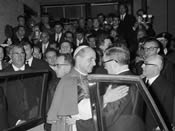“Prayer” is commonly defined as “the lifting up of the heart and mind to God”. “Heart” here means the seat of our affections—our desire for God, sorrow for sin, gratitude, joy—but it also includes our intelligence and free will. In other words, prayer is the turning of our "inside" (which does not necessarily exclude our exteriors) towards God; a “union with God” or “being with God”—so as to adore Him, to express our contrition for the times of our turning away from Him, to thank Him for everything, and to ask for everything. It involves our spiritual faculties—the intelligence and free will—as well as our sensual appetites (which operate in our passions or emotions).
There are basically three kinds of individual prayer: vocal prayer, meditation, and contemplation. The term, “mental prayer”, is often used to include both meditation and contemplation.
Prayer is vocal when it is “discursive”, i.e., we turn to God using human language, our normal mode of communicating. It is meditation when it goes beyond words into involving more the other faculties: the imagination and memory (the internal senses) and the appetites; the mind, understanding the truths of faith in God’s presence; and our free will, making decisions or resolutions to conform more to God. Prayer becomes contemplation when these operations of the faculties in meditation become simplified into one, integrated whole, as a “single” action of being with God. The saints, especially the “mystics” (gifted with “paranormal” experience of God, e.g., “ecstasy” and intuitive or immediate knowledge of things) describe different degrees of “contemplation”.
Contemplation is the highest form of private, individual prayer: it approaches what is essentially the “activity” of the saints in eternity—simply seeing God “face to face” (the “beatific vision”), simply enjoying God. Meditation, the next highest, helps us get there, as an intermediate stage. Although placed at the lowest level, vocal prayers serve, not only as a good starting point, but also as “fuel” to maintain us in praying. In practice, all three forms of prayer are often intermingled. Maintaining “presence of God” can be contemplation. This is what St. Josemaria meant in saying, “we have to be contemplative souls in the midst of the world, who try to convert their work into prayer.” (Furrow, No. 497) Among the ways to fuel contemplation is to recite, repeatedly, many times during the day, some short vocal prayer—aspirations (“breathed-out” prayers)—taken from sacred scripture or some liturgical prayer, e.g., “Be it done!” Fiat! (Lk 1:38); “Lord, that I may see!” Domine, ut videam! (Lk 18:41); “Lord, what do you want me to do?” Domine, quid me vis facere? (Acts 9:6); etc.
In the liturgy ("public worship", the celebration of the Sacraments and sacramentals)—which is the prayer of the Church, the community of believers—the individual participant may actually enter into all three forms of private prayer (vocal, meditation and contemplation). Liturgical prayer is most pleasing to God because it is Christ Himself praying. Thus, the Eucharist is the highest form of all prayer because in it, Christ Himself is the Priest making the offering as well as the Victim being offered to God.
We need to convert all our time, all our work and leisure, our ordinary activities, into “prayer”, if we are to become saints. This is to comply with the scriptural command: “Pray without ceasing!” (1 Thes 5:17).
To pray always, we need to be able to pray, at least, at fixed times. That is why we should have regular “acts of piety”; so that our daily schedules would be built around our prayer life. Rather than stealing from our time for work, these acts of piety would make our work more valuable (pleasing in the eyes of God) because a well-planned day, in which our regular acts of piety are evenly distributed, would help us to maintain presence of God. Thus, our work can actually be done in God’s presence and so become prayer itself. Prayer also helps to “multiply” our time for work—our work gets done better, becomes more fruitful, especially in terms of sanctifying ourselves and others (personal holiness and apostolate), which is what matters most in the end.
St. Josemaria writes: “Try to commit yourself to a plan of life and to keep to it: a few minutes of mental prayer, Holy Mass—daily, if you can manage it—and frequent Communion; regular recourse to the Holy Sacrament of Forgiveness—even though your consciences do not accuse you of mortal sin; visiting Jesus in the tabernacle; praying and contemplating the mysteries of the Holy Rosary, and so many other marvelous devotions you know or can learn.” (Friends of God, No. 149)
“For some of you, all this may sound quite familiar; for others, it may be something new; for everybody, it is demanding. As for me, as long as I have the strength to breathe, I will continue to preach that it is vitally necessary that we be souls of prayer at all times, at every opportunity, and in the most varied of circumstances…When we seek our Lord in this way, our whole day becomes one intimate and trusting conversation with him… constant prayer should be for a Christian as natural as the beating of his heart.” (Id., No. 247)
O.C.P.A.J.P.M.








